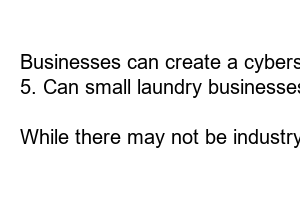세탁업 사이버 위생교육
Title: Embracing Cyber Hygiene Education in the Laundry Industry
Introduction:
In today’s digital age, where technology governs our daily lives, cyber hygiene education has become more important than ever. While most industries have recognized the need for cybersecurity measures, the laundry industry remains somewhat overlooked. In this blog post, we will explore the significance of cyber hygiene education and its potential impact on the laundry industry.
1. What is Cyber Hygiene?
Cyber hygiene refers to a set of practices and habits that individuals and organizations adopt to ensure the security of their digital assets. It involves implementing robust security measures, staying updated on the latest threats, and maintaining good cyber practices.
2. The Vulnerabilities of the Laundry Industry
The laundry industry may seem unaffected by cyber threats, but it is not immune. From online payment systems to customer data storage, there are various entry points for cybercriminals to exploit. Laundry businesses handle personal and financial information, making them potential targets for hackers seeking confidential data.
3. The Need for Cyber Hygiene Education in the Laundry Industry
Educating laundry industry professionals about cyber hygiene can empower them to protect their businesses and customers. By implementing strong passwords, regularly updating software, and recognizing phishing attempts, employees can become the first line of defense against cyber threats.
4. Building Cybersecurity Culture within the Laundry Industry
By fostering a cybersecurity culture, laundry industry leaders can ensure that all employees are aware of the potential threats and the best practices to mitigate them. Conducting regular training sessions, creating cybersecurity policies, and frequently reminding staff about their importance will help create a vigilant and security-conscious work environment.
5. Collaboration and Industry Standards
To effectively combat cyber threats, the laundry industry should collaborate with experts and regulatory bodies to develop industry-specific cybersecurity standards. By sharing information and best practices, the industry as a whole can stay one step ahead of cybercriminals.
6. The Benefits of Cyber Hygiene Education in the Laundry Industry
Integrating cyber hygiene education into the laundry industry can have several benefits. It will not only protect businesses from cyber threats but also enhance their reputation and build trust with customers. Additionally, it can help prevent costly data breaches and legal consequences, saving both time and money.
Summary:
In conclusion, cyber hygiene education is a crucial aspect that the laundry industry must not overlook. By embracing cybersecurity practices, implementing industry-specific standards, and fostering a cybersecurity culture, the industry can bolster its defenses against cybercriminals. Investing in cyber hygiene education will not only protect businesses but also improve their image and safeguard customer data. It’s time for the laundry industry to prioritize cybersecurity and take proactive steps towards a safer digital future.
—
Frequently Asked Questions (FAQs):
1. How can cyber hygiene education benefit laundry businesses?
Cyber hygiene education can protect laundry businesses from data breaches, enhance their reputation, and build trust with customers.
2. What are some common cyber threats that the laundry industry may face?
Laundry businesses may face threats such as phishing attempts, ransomware attacks, and data breaches.
3. How can laundry industry professionals stay informed about the latest cyber threats?
Regularly updating software, subscribing to cybersecurity newsletters, and attending industry-specific webinars or conferences can help professionals stay updated on the latest cyber threats.
4. How can laundry businesses create a cybersecurity culture?
Businesses can create a cybersecurity culture by conducting regular training sessions, creating cybersecurity policies, and encouraging employees to report any suspicious activity.
5. Can small laundry businesses benefit from cyber hygiene education?
Yes, small businesses are often targeted by cybercriminals due to their perceived vulnerabilities. By implementing cyber hygiene practices, small laundry businesses can protect themselves from potential threats.
6. Are there any regulatory bodies or organizations that provide guidance on cybersecurity for the laundry industry?
While there may not be industry-specific regulatory bodies, organizations such as the National Institute of Standards and Technology (NIST) offer comprehensive cybersecurity guidelines that can be applied to the laundry industry.

